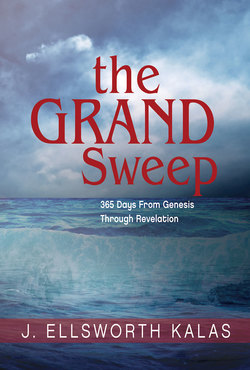Читать книгу The Grand Sweep - Large Print - J. Ellsworth Kalas - Страница 60
На сайте Литреса книга снята с продажи.
ОглавлениеPrayer Time
Here are some days of celebration in my life for which I want to give thanks:
Here are some people who, to my knowledge, don’t have too many reasons to celebrate. I will pray daily for them:
How the Drama Develops LEVITICUS 14—NUMBERS 6
The drama of life is lived out in daily (indeed, momentary) encounters—encounters with God, with humankind, with nature, and with the secret places of our own souls. Some of these encounters are of such proportions that everyone recognizes them as crucial and life-changing. Those are the ones around which poets and novelists weave their plots. Most of our encounters are so routine, however, that we hardly notice them. Yet these encounters, in total, are the material, ultimately, from which the full drama is made. The so-called life-changing events are usually only the routine come to full fruition.
So the Hebrew law pays a great deal of attention to the routine. There are regulations for harvesting the fields to be sure there is provision for the poor (Leviticus 19:9-10), and for the way day laborers are paid to protect them against insensitive abuse by those who might not understand the degree of their poverty (19:13). Grudges are a way of life for some people and at times a test of character for all of us—trivial, yes, but significant in the fabric of our lives; so the Law deals with them (19:17). And always there is the reminder that these laws come from the One who brought the Israelites “out of the land of Egypt” (19:36). The Source of the laws has a claim on their lives because they owe their freedom to him.
But lest routine sound dull, let me hasten to note that Leviticus presented a way of life that was highlighted by a series of recurring holy days. The people celebrated! Sometimes it was in occasions of awe, as with the Day of Atonement. But more often there were events of gladness, such as the harvest festivals and the new year. These events must surely have taught the people that life is more than an assignment to be fulfilled; it is a gladness to be exulted.
Celebrations are part of the plot line of life and of eternity. We are creatures with birthdays, anniversaries, memories. Our handling of our days is influenced by the blessed interruption of special days; without such special days we would quickly become less than human. Perhaps, in a sense, celebrations are reminiscent of the Eden we have lost and a prodding toward the heaven we seek.
When the Israelites remembered where they had come from, they knew there was reason to celebrate. If you sometimes feel Leviticus is dull, ponder this wonderful sentence: “I am the LORD your God who brought you out of the land of Egypt, to be their slaves no more; I have broken the bars of your yoke and made you walk erect” (26:13). The sabbath—the weekly festival—reminded them they were no longer slaves. Slaves must work at all times at their owner’s bidding; the sabbath reminded the people that we are not slaves to our work; we can “walk erect.”
The quality of blessing seems to appear in these books of the Pentateuch in unlikely places. Numbers begins with the census data that gives it its name, then moves into issues of law and priestly procedure, when—almost out of the blue, it seems—there is a blessing: “The LORD bless you and keep you” (Numbers 6:24-26).
In a world where there is so much cursing, both spoken and implied, Israel walked under a blessing. And so should we.
Seeing Life Through Scripture
I wonder how our culture would handle the rules laid out in Leviticus 25. There is first of all a law that ought to gladden our ecology-conscious age: Each seventh year, the people were to let the land rest. It was a simple, sound system of soil conservation; but people would obey it only if they were free of the grasping nature that wants to get as much as it can as soon as it can.
The law of the year of jubilee is even more challenging. It required that debts be canceled in the fiftieth year, that land be restored to the original owner or his or her descendants, and that slaves be set free. I’m not sure I can defend this system for our economic society; but when I acknowledge that perhaps it is unrealistic, a nagging voice reminds me that our present system doesn’t work too well either.
I will confess readily that laws such as these wouldn’t work unless a society began with the conviction that the land and its resources belong not to us but to God. The writer of Leviticus is very clear: “The land shall not be sold in perpetuity, for the land is mine; with me you are but aliens and tenants” (25:23). And in truth, these laws were noted in Israel itself more in the violation than in the observance—and it was because the people found it hard to remember (as we do) that the land is the Lord’s; we are tenants here. Perhaps if we understood that better, we would treat the environment with greater care.
The Sum of It All
“I am the LORD; I sanctify you, I who brought you out of the land of Egypt to be your God: I am the LORD” (Leviticus 22:32-33).
